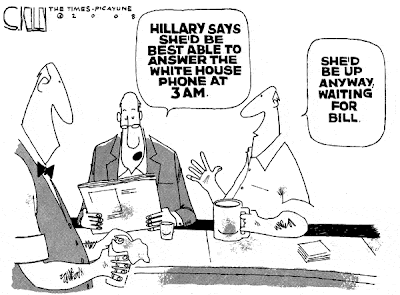Bob Herbert came on my radar when he blew the whistle on the travesty of justice in Tulia, TX several years ago. A rogue undercover narc fingered most of the African American adult population of Swisher County as drug dealers. The crack (no pun intended) regional drug task force and bumbling local law enforcement establishment bought the unsubstantiated charges lock, stock, and barrel. However, acting on a tip from Texas, Bob Herbert looked into the case and blew the doors off Texas drug enforcement in the Texas Panhandle. Most (if not all) of the bogus convictions were overturned. Now, Bob Herbert blows the doors off the hoax of the century: the actual cost of the Nightmare in Iraq: $2 Trillion on the books and more likely, $3 Trillion in total liabilities. The bromide about public lies ("Make the lie as huge as possible to forestall disbelief.") also works for fraud ("Don't steal anything but huge amounts to forestall apprehension."). If this is (fair & balanced) deficit-assessment, so be it.
[x NY Fishwrap]
The $2 Trillion Nightmare
By Bob Herbert
We’ve been hearing a lot about “Saturday Night Live” and the fun it has been having with the presidential race. But hardly a whisper has been heard about a Congressional hearing in Washington last week on a topic that could have been drawn, in all its tragic monstrosity, from the theater of the absurd.
The war in Iraq will ultimately cost U.S. taxpayers not hundreds of billions of dollars, but an astonishing $2 trillion, and perhaps more. There has been very little in the way of public conversation, even in the presidential campaigns, about the consequences of these costs, which are like a cancer inside the American economy.
On Thursday, the Joint Economic Committee, chaired by Senator Chuck Schumer, conducted a public examination of the costs of the war. The witnesses included the Nobel Prize-winning economist, Joseph Stiglitz (who believes the overall costs of the war — not just the cost to taxpayers — will reach $3 trillion), and Robert Hormats, vice chairman of Goldman Sachs International.
Both men talked about large opportunities lost because of the money poured into the war. “For a fraction of the cost of this war,” said Mr. Stiglitz, “we could have put Social Security on a sound footing for the next half-century or more.”
Mr. Hormats mentioned Social Security and Medicare, saying that both could have been put “on a more sustainable basis.” And he cited the committee’s own calculations from last fall that showed that the money spent on the war each day is enough to enroll an additional 58,000 children in Head Start for a year, or make a year of college affordable for 160,000 low-income students through Pell Grants, or pay the annual salaries of nearly 11,000 additional border patrol agents or 14,000 more police officers.
What we’re getting instead is the stuff of nightmares. Mr. Stiglitz, a professor at Columbia, has been working with a colleague at Harvard, Linda Bilmes, to document, among other things, some of the less obvious costs of the war. These include the obligation to provide health care and disability benefits for returning veterans. Those costs will be with us for decades.
Mr. Stiglitz noted that nearly 40 percent of the 700,000 troops from the first gulf war, which lasted just a month, have become eligible for disability benefits. The current war is approaching five years in duration.
“Imagine then,” said Mr. Stiglitz, “what a war — that will almost surely involve more than 2 million troops and will almost surely last more than six or seven years — will cost. Already we are seeing large numbers of returning veterans showing up at V.A. hospitals for treatment, large numbers applying for disability and large numbers with severe psychological problems.”
The Bush administration has tried its best to conceal the horrendous costs of the war. It has bypassed the normal budgetary process, financing the war almost entirely through “emergency” appropriations that get far less scrutiny.
Even the most basic wartime information is difficult to come by. Mr. Stiglitz, who has written a new book with Ms. Bilmes called “The Three Trillion Dollar War,” said they had to go to veterans’ groups, who in turn had to resort to the Freedom of Information Act, just to find out how many Americans had been injured in Iraq.
Mr. Stiglitz and Mr. Hormats both addressed the foolhardiness of waging war at the same time that the government is cutting taxes and sharply increasing non-war-related expenditures.
Mr. Hormats told the committee:
“Normally, when America goes to war, nonessential spending programs are reduced to make room in the budget for the higher costs of the war. Individual programs that benefit specific constituencies are sacrificed for the common good ... And taxes have never been cut during a major American war. For example, President Eisenhower adamantly resisted pressure from Senate Republicans for a tax cut during the Korean War.”
Said Mr. Stiglitz: “Because the administration actually cut taxes as we went to war, when we were already running huge deficits, this war has, effectively, been entirely financed by deficits. The national debt has increased by some $2.5 trillion since the beginning of the war, and of this, almost $1 trillion is due directly to the war itself ... By 2017, we estimate that the national debt will have increased, just because of the war, by some $2 trillion.”
Some former presidents — Washington, Franklin Roosevelt, Truman, Eisenhower — were quoted at the hearing on the need for accountability and shared sacrifice during wartime. But this is the 21st century. That ancient rhetoric can hardly be expected to compete for media attention, even in a time of war, with the giddy fun of S.N.L.
It’s a new era.
[Bob Herbert joined The New York Times as an Op-Ed columnist in 1993. His twice a week column comments on politics, urban affairs and social trends.
Prior to joining The Times, Mr. Herbert was a national correspondent for NBC from 1991 to 1993, reporting regularly on "The Today Show" and "NBC Nightly News." He had worked as a reporter and editor at The Daily News from 1976 until 1985, when he became a columnist and member of its editorial board.
In 1990, Mr. Herbert was a founding panelist of "Sunday Edition," a weekly discussion program on WCBS-TV in New York, and the host of "Hotline," a weekly issues program on New York public television.
He began his career as a reporter with The Star-Ledger in Newark, N.J., in 1970. He became its night city editor in 1973.
Born in Brooklyn on March 7, 1945, Mr. Herbert received a B.S. degree in journalism from the State University of New York (Empire State College) in 1988. He has taught journalism at Brooklyn College and the Columbia University Graduate School of Journalism. He lives in Manhattan on the Upper West Side.]
Copyright © 2008 The New York Times Company
Get an RSS (Really Simple Syndication) Reader at no cost from Google. Another free Reader is available at RSS Reader.

